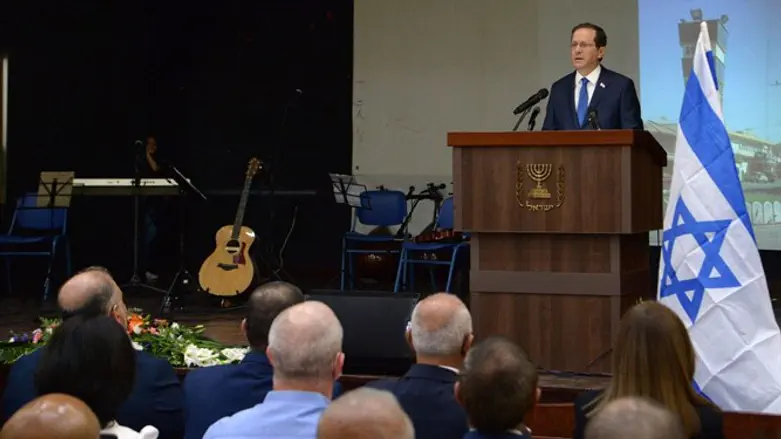
On Friday, Israeli President Isaac Herzog visited the Arab-Israeli village of Kafr Qassem and addressed a memorial to the victims of the Kafr Qassem Massacre.
In that event, which took place on October 29, 1956, on the first day of the Suez Campaign, forty-nine people were killed.
Speaking at the memorial ceremony, Herzog said, "I am standing here before you today with my head bowed and my heart pained, on the sixty-fifth anniversary of one of the saddest events in the history of our country - an event whose gravity has never been in question. For it is clear to all of us: the killing and injury of innocents are absolutely forbidden. They must remain beyond all political arguments!"
"I bow my head before the memory of the forty-nine victims. I bow my head before you, their families, and before the inhabitants of Kafr Qassem throughout the ages, and on behalf of myself and the State of Israel, I ask for forgiveness.
"I extend a supportive and embracing hand to you, and I pray from the depths of my heart that the merciful and compassionate God will be by your side," he concluded.
Following this, the President then repeated his remarks from, "I bow my head before the memory…" in Arabic.
He then added, "History shows us that a country's strength is judged also by its ability to look directly at events in its past. But, my brothers and sisters, the past, difficult as it may be, is the most important engine for our present and future here in the State of Israel. The deep wound that opened up here, in this place, sixty-five years ago, is a wound for the whole of Israeli society — Jews and Arabs alike. Since that terrible tragedy, the prohibition on manifestly illegal orders has been engraved in stone."
"This lesson has been taught for decades and will continue to be taught, from generation to generation. And I support the initiative for it to be taught in an organized fashion in the education system. All across the State of Israel, students at school, youth movement participants, soldiers, commanders, and officers in the IDF and all the security forces learn about this terrible event and the lessons learned from it."
"This ceremony," he stressed, "marking sixty-five years since the catastrophe that took place right here, is not only a moment for soul-searching about our past — it is also an important opportunity to look at our shared future. It is not too late to fix what needs fixing."
"On the contrary, this is exactly the time to do so. This is our opportunity, as a society, to say no to prejudice. This is our opportunity, as a human society, to empower what we have in common as citizens and as neighbors. This is not a decree of fate, but a partnership of fate. This is our opportunity to uproot discrimination and hatred.
"Ladies and gentlemen, in my inaugural address as President, I said explicitly that I intend to touch our most painful subjects in Israeli society. If we do not do so, we will not rise to our shared challenges. On this day, sixty-five years after the catastrophe, we shall pray and hope that the memory of the victims will stay with us as a lesson and a compass, and that from the depths of the pain we shall sprout forth together a shared future, one full of hope."
